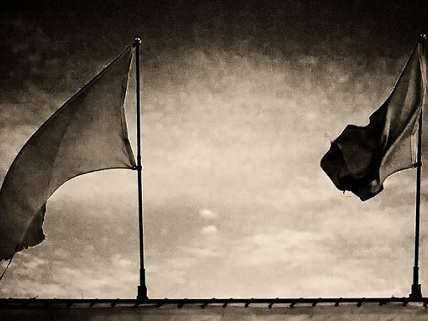Everybody's an Anarchist Sometimes
Everybody.

Ben Powell of the Independent Institute explains at the Freeman:
Consider Cambodia in the late 1970s. The Khmer Rouge government intentionally killed more than two million of its own citizens. That's an average of eight percent of the population killed each year while government simultaneously inflicted countless other horrors. Do you think the Cambodian people, faced with that government, would have been better off with no government at all? Congratulations. You are, sometimes, an anarchist.
The anarchist-minarchist debate usually revolves around how well an ordered anarchy could work. How well could law and order be provided without state provision? That is an important question—one that Murray Rothbard, David Friedman, and James Buchanan made important theoretical contributions to in the 1970s. Bruce Benson and others started making historical contributions in the 1980s. And starting in the late 1990s, scholarship on the question virtually exploded.
Reasonable classical liberals can digest this scholarship and disagree about how well an "ordered anarchy" might work. But whether you cling to Hobbesian notions of a nasty, brutish, and short life in anarchy, or believe anarchy would be libertarian paradise, you have only answered half the question about anarchy's desirability. The other half of the question is, "Compared to what government"?
He takes the infamous example of Somalia, one of liberals' favorite strawmen for libertarianism:
Cases like Pol Pot's Cambodia are easy calls for most of us. It would take extraordinary Hobbesian assumptions about life without a state to think that Cambodians were better off with his government than they would have been without a state at all. The Chinese under Mao, Russians under Stalin, Germans under Hitler—they all fall in the same category.
The real question is how far to move the line. Somalia had a fairly predatory state until its collapse in 1991, but it wasn't nearly as murderous as those above. It's been in a state of anarchy since then. To the extent we can measure them, living standards seem to have improved since the state collapsed. In fact, they've improved faster than the sub-Saharan African average.
When classical liberals talk about Somalia it is not because it represents some ideal libertarian anarchy. It doesn't. We talk about Somalia because it passes the comparative institutions test. Its imperfect anarchy seems to be doing better than the very imperfect state that preceded it and many of those states it shares a continent with.
This does not prove that a limited minimal government wouldn't work better in Somalia. But that is not the relevant question. As I argued in response to a bunch of nation-builders at a conference on Somalia a couple of years ago: Whatever version of a government you think is ideal, it is probably not achievable in Somalia.
Consider other African governments today. Most brutally suppress the freedom of their subjects and have horrible standards of living. Check out their Polity IV scores on how liberal/democratic they are, or their economic freedom scores. How many of them, like Somalia, would be better off stateless?
Read the rest of Powell's piece here and more Reason on Somalia here.


Show Comments (405)